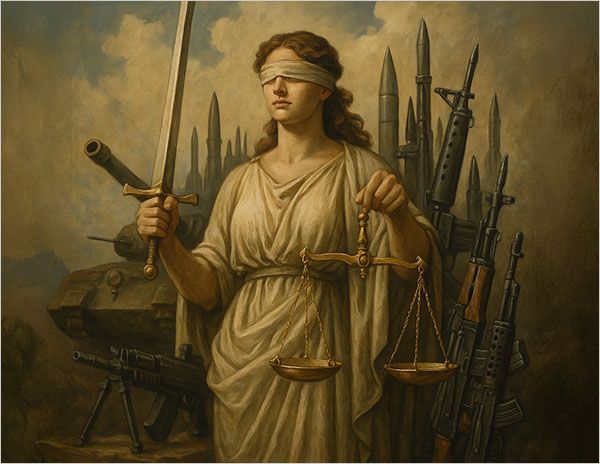
The rearmament of Europe is an unfortunate – but seemingly necessary – development. It further highlights the crucial role of mining as a strategic partner.
It is clear that rearmament is happening in Europe under duress.
It is being driven by a pincer movement of a threatened Russian attack and the seeming preparedness of the US to walk away from supporting Europe’s defences. I believe the unprovoked invasion of Ukraine by Russia, and the atrocities they’ve committed there, fully justifies the Europeans boosting their defences so their populations don’t suffer the same fate.
Principles of Just War
Crucially, the Europeans – and also other nations such as Canada, Australia, and Japan – are not expanding their militaries to wage wars of conquest. This fact comports with the principles of “Just War Theory”, which have been developed over many centuries by a combination of philosophers, theologians, and legal thinkers.
These principles notably include waging war only as a last resort, that it must be started by a legitimate authority, not target civilians and can only be fought in self-defence. Importantly, the ultimate goal of a just war is to re-establish peace as quickly as possible.
European defence in numbers
EU countries spent around €279 billion on defence in 2023, a 10% increase from the previous year and is estimated to have hit €326 billion in 2024, according to The European Defence Agency (EDA).
And that’s just for starters. The European Commission proposes freeing up to €800 billion over the coming years to bolster Europe's defence capabilities through a mix of loans and accounting slights of hand. There is some scepticism that this full amount will be spent on weapons – but even so there is little doubt that Europe is set to spend a lot more on weapons in the next 10 years.
In fact, the International Institute for Strategic Studies estimates that global defence spending rose to $2.46 trillion in 2024 from $2.24 trillion the previous year and is due to rise further.
Now for the metals
These developments rest on an unspoken presumption that the mining industry, which already suffers from significant under-investment and neglect by institutional investors, will step up with all the necessary metals. And this comes on top of the metals demands implied by the energy transition, which both Europe and China remain committed to.
Apart from lots of steel and aluminium, weapons makers require certain other metals, some of which are rare or vulnerable to disruption.
For example, tungsten is used in armour-piercing and kinetic energy weapons (China controls ~80% of global supply). Rare earth elements (REEs), such as neodymium, samarium, yttrium, dysprosium, terbium and Lanthanum (China controls ~80% of global supply) are used in a wide range of electronic and optical defence applications.
Cobalt is widely used in jet turbines, rockets, secure military systems and drones (over 70% of cobalt comes from the Democratic Republic of Congo with China controlling much of the refining).
Then there are other metals, such as beryllium and tantalum, which are also important for making military equipment.
For those of you who follow the debates around the energy transition – the names of some of these metals will be familiar. Metals and elements, such as titanium, tungsten, cobalt and REEs come to mind. Then there are more common metals such as copper, nickel and lithium (think batteries for drones, portable electronic equipment etc ...), which both industries need. With the big increases in defence spending – all these metals are going to see more demand.
The ESG angle
Meanwhile, there have been calls by some UK parliamentarians, ironically from the left of the political spectrum, to classify defence companies as ESG compatible for investment purposes – no doubt with the “Just War” principles in mind. I’m not going to debate whether or not this should be the case.
However, if European defence companies do want to win over at least some of the ESG investment community then they need to have squeaky clean supply chains – especially given what their products are designed to do.
In many cases those supply chains start in mines in faraway places such as Africa, South America and Asia. All this extra demand is going to require a lot more mines around the world, which need financing.
Given Europe’s commendable values around promoting human rights – this investment could and should bring benefits to the economies and host communities in these regions.
This is yet another reason why institutional investors should back responsible mining. It is no longer only about the energy transition, there is now a very real existential issue for the Europeans to consider. And yes, it will require even more metal and more investment support for the mining industry.
